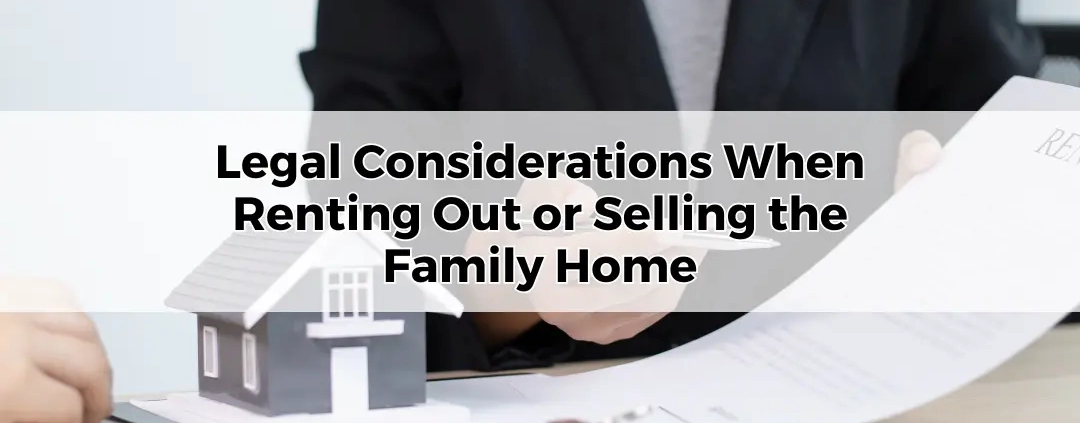Legal Considerations When Renting Out or Selling the Family Home
Table of Contents
ToggleAs individuals or couples transition into aged care, the family home often becomes a key focus of decision-making. Renting or selling this property can have far-reaching legal and financial implications, influencing aged care fees, tax obligations, and estate planning. This guide explores these considerations to help families navigate this complex process effectively.
The Role of the Family Home in Aged Care Planning
The family home often represents a significant portion of personal wealth. Decisions surrounding its future can directly impact an individual’s ability to fund aged care services and accommodation. For many, the home serves as both an emotional anchor and a financial resource.
Renting and selling the family home have distinct legal and financial consequences. While renting can provide ongoing income, it also involves landlord responsibilities and tax obligations. Selling, on the other hand, releases a lump sum but may trigger changes in aged care fees and estate distribution plans.
Impact on Aged Care Means Testing
When determining aged care fees, Centrelink assesses assets and income. The family home may be exempt under specific circumstances, such as when a spouse or dependent continues living there. However, exemptions are time-sensitive and can change depending on whether the property is rented or sold.
A home’s exemption status from means testing typically lasts for two years after the owner enters aged care, provided it is not rented. Renting or selling may convert the property into an assessable asset, affecting accommodation charges and ongoing care fees.
Selling the Family Home
Proceeds from a home sale become part of assessable assets under the means test. This can increase means-tested care fees, particularly if the proceeds exceed the permissible asset thresholds.
The family home is generally exempt from capital gains tax (CGT) if sold as a primary residence. However, complications may arise if the sale is delayed, or the property has been used to generate income, such as renting it out.
Selling a property involves significant legal formalities, including:
- Preparing the property for sale, such as addressing legal and compliance issues.
- Engaging a real estate agent for property valuation and marketing.
- Finalising sale contracts, which require legal oversight to ensure compliance with conveyancing laws.
Renting Out the Family Home
Becoming a landlord requires adherence to tenancy laws. Key considerations include drafting lease agreements, fulfilling tenant rights, and maintaining property standards. Failure to meet legal requirements can result in penalties.
Rental income is fully assessable under the aged care means test. This additional income can increase care fees, potentially negating the financial advantage of renting out the property.
Renting out a property involves compliance with council regulations, safety standards, and obtaining landlord insurance. These measures protect the homeowner’s interests and ensure legal and financial security.
Legal Process for Retaining Ownership While Renting
When renting out the home, owners must update property records with local councils and service providers to reflect the rental status.
A well-drafted lease agreement is essential to define tenant responsibilities, protect owner rights, and ensure legal enforceability of rental terms.
Implications of Capital Gains Tax on the Family Home
Primary residences are generally exempt from CGT in Australia. However, if the property is rented or sold after six years of the owner moving out, CGT may apply.
When a property is rented, its value increase from the rental start date until the sale date may be subject to CGT. This could substantially reduce the overall financial benefit of renting.
Age Pension and Rent Assistance Eligibility
Selling the family home can alter Age Pension eligibility. If individuals transition from home ownership to renting, they may qualify for Rent Assistance, depending on their circumstances.
Rental income is considered under the income test for the Age Pension. This can result in reduced payments, limiting the financial benefit of rental arrangements.
Tax Obligations for Rental Income
Rental income is taxable and must be reported to the Australian Taxation Office (ATO). Owners can claim deductions for property management, repairs, and other related expenses to offset taxable income.
Common deductible expenses include:
- Maintenance and repairs.
- Landlord insurance premiums.
- Interest on loans used to fund property improvements.
Estate Planning Considerations When Selling or Renting
The decision to sell or rent the family home influences estate distribution. Selling the home simplifies asset division, while renting may complicate inheritance due to ongoing responsibilities.
Significant changes to assets necessitate updates to wills, enduring powers of attorney, and advance care directives. This ensures the estate plan reflects the current asset structure.
Legal Protections for Surviving Spouse or Dependent
Establishing legal structures, such as trusts or life estates, can protect the occupancy rights of surviving spouses or dependents.
Proper structuring of rental income or sale proceeds ensures financial stability for surviving family members and compliance with means testing rules.
Using Trusts or Life Estates in Family Home Decisions
A life estate grants the right to live in the home while ownership resides with others, offering security to the occupant and estate planning benefits for heirs.
Placing the family home in a trust can safeguard assets from legal claims and optimise tax outcomes. However, this may impact means testing and Centrelink assessments.
Navigating Family Expectations and Legal Disputes
Transparent discussions about the family home help manage expectations and reduce the likelihood of disputes among heirs or family members.
Obtaining family consensus, or involving neutral advisers, ensures decisions around the family home are fair and legally sound.
Consulting Legal and Financial Advisors
A financial adviser can help evaluate whether selling or renting aligns with the individual’s aged care needs and financial objectives.
Engaging a lawyer ensures contracts, compliance, and tax obligations are managed effectively during property transactions.
Special Considerations for Aged Care Loans and Equity Release Products
Proceeds from the sale of the family home can repay aged care loans, reducing debt burdens and simplifying financial management.
Equity release products may limit future options for selling or renting, as they create obligations that transfer to the property title.
Government Programs and Assistance for Downsizers
Individuals over 65 can contribute up to $300,000 of sale proceeds into superannuation, providing tax advantages and boosting retirement savings.
Programs such as the Pensioner Concession Scheme may assist in managing sale proceeds while minimising impacts on pension eligibility.
Conclusion
The choice to sell or rent should reflect long-term financial, personal, and estate goals. Balancing aged care needs and family expectations is key.
Engaging financial planners, tax professionals, and legal experts ensures families make well-informed decisions about the family home, minimising risks and maximising benefits.
By understanding the legal and financial nuances of renting or selling the family home, Australians can better navigate the complexities of aged care transitions, ensuring compliance, financial stability, and peace of mind for all involved.









